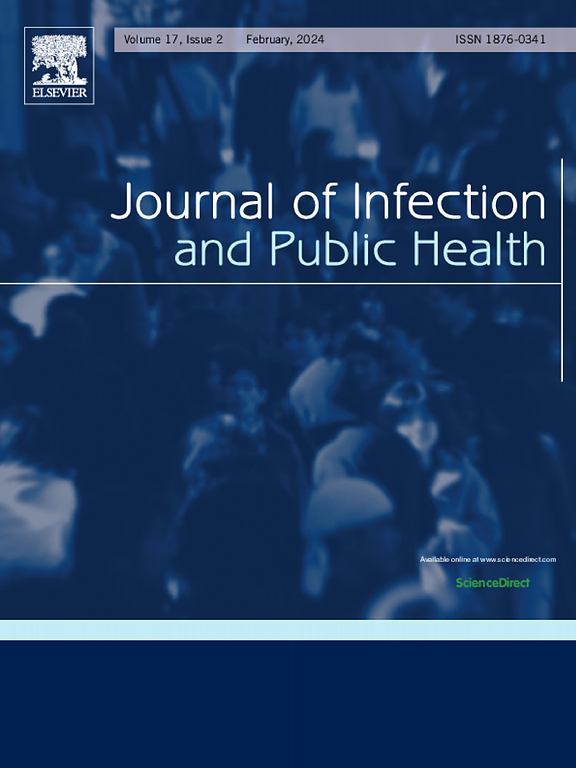Severe angiostrongyliasis with neuropsychiatric symptoms in vulnerable adults: Early diagnosis via next-generation sequencing and successful treatment
IF 4.7
3区 医学
Q1 INFECTIOUS DISEASES
引用次数: 0
Abstract
Angiostrongylus cantonensis (AC) is a parasite that occasionally infects humans, causing eosinophilic meningitis (EM). In this study, we identified two adult males with severe angiostrongyliasis being treated at the ICU. Both presented with mental and behavioral abnormalities and were initially treated for psychiatric disorders before showing symptoms like cough, fever, and altered consciousness. Patient 1, a homeless individual, presented with elevated eosinophil levels and typical meningitis symptoms, prompting an early diagnosis of EM that was later confirmed via next-generation sequencing (NGS) of the cerebrospinal fluid. Patient 2, who had schizophrenia as a pre-existing condition, did not exhibit the typical signs of meningitis but was nonetheless detected via NGS. Both patients responded well to corticosteroids and anthelmintics. A review of case reports underscores heightened infection risks among children with pica and vulnerable adults, including those with mental disorders or homelessness. The use of NGS is effective for the early diagnosis and treatment of severe angiostrongyliasis, especially in those with atypical symptoms.
易感成人伴神经精神症状的严重血管圆线虫病:通过下一代测序进行早期诊断和成功治疗
广州管圆线虫(AC)是一种偶尔感染人类的寄生虫,引起嗜酸性脑膜炎(EM)。在这项研究中,我们确定了两名在ICU接受治疗的严重血管圆筒形线虫病的成年男性。两人都表现出精神和行为异常,并在出现咳嗽、发烧和意识改变等症状之前,最初接受了精神疾病治疗。患者1,一个无家可归的人,表现为嗜酸性粒细胞水平升高和典型的脑膜炎症状,促使早期诊断为EM,后来通过脑脊液的下一代测序(NGS)证实。患者2先前患有精神分裂症,没有表现出脑膜炎的典型症状,但仍通过NGS检测到。两名患者对皮质类固醇和驱虫药反应良好。对病例报告的回顾强调了异食癖儿童和易受感染的成年人(包括那些有精神障碍或无家可归的人)的感染风险增加。NGS对严重血管圆线虫病的早期诊断和治疗是有效的,特别是对那些具有非典型症状的患者。
本文章由计算机程序翻译,如有差异,请以英文原文为准。
求助全文
约1分钟内获得全文
求助全文
来源期刊

Journal of Infection and Public Health
PUBLIC, ENVIRONMENTAL & OCCUPATIONAL HEALTH -INFECTIOUS DISEASES
CiteScore
13.10
自引率
1.50%
发文量
203
审稿时长
96 days
期刊介绍:
The Journal of Infection and Public Health, first official journal of the Saudi Arabian Ministry of National Guard Health Affairs, King Saud Bin Abdulaziz University for Health Sciences and the Saudi Association for Public Health, aims to be the foremost scientific, peer-reviewed journal encompassing infection prevention and control, microbiology, infectious diseases, public health and the application of healthcare epidemiology to the evaluation of health outcomes. The point of view of the journal is that infection and public health are closely intertwined and that advances in one area will have positive consequences on the other.
The journal will be useful to all health professionals who are partners in the management of patients with communicable diseases, keeping them up to date. The journal is proud to have an international and diverse editorial board that will assist and facilitate the publication of articles that reflect a global view on infection control and public health, as well as emphasizing our focus on supporting the needs of public health practitioners.
It is our aim to improve healthcare by reducing risk of infection and related adverse outcomes by critical review, selection, and dissemination of new and relevant information in the field of infection control, public health and infectious diseases in all healthcare settings and the community.
 求助内容:
求助内容: 应助结果提醒方式:
应助结果提醒方式:


